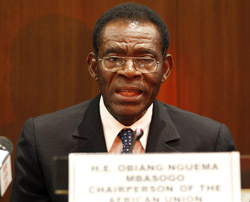The African Union announced on Sunday that the president of Equatorial Guinea, Teodoro Obiang, will become the new chairman in the union’s yearly rotating leadership. The first debate Obiang (at left) presided over at the two-day AU conference that ends today in Addis Ababa, Ethiopia, concerned “shared values”–highlighting issues of democracy and good governance. Representing one of Africa’s most oppressive dictatorships, with a completely stifled press, the new AU chair could hardly refer to personal experience in such a debate.
The tiny, oil-rich country was said to have one of the world’s fastest growing economies in 2004 yet 60 percent of the population live on less than a dollar a day, according to The Associated Press. The anti-graft watchdog Transparency International has put the country in the top 12 of its list of most corrupt states. Obiang has managed to accrue vast fortunes since 1979 by maintaining an iron grip over the opposition and the press.
The country’s broadcast media is state-controlled minus one nominally private radio station, Radio Asonga, which is owned by Obiang’s son. While two of the four newspapers circulating in the country are private, the papers practice heavy self-censorship to survive. The tiny foreign press corps cannot report freely either. Police detained Agence France-Presse reporter Samuel Obiang Mbana for hours at Malabo airport in March 2010 where he had gone to cover the arrival of heads of state for a regional economic conference, local journalists told CPJ. Mbana’s predecessor, Rodrigo Angue Nguema, was imprisoned for four months in Malabo’s notorious Black Beach Prison in 2009 in a defamation case.
The Information Ministry regulates the media; its staff belongs entirely to the ruling party. In January 2010, Deputy Information Minister Purita Opo Barila dismissed four state broadcast journalists for “insubordination” and “lack of enthusiasm.” After state journalist Pedro Luis Esono did a live broadcast revealing seven dead bodies at the city’s dumps a month later, authorities detained the reporter for three days in the coast city of Bata without charging him.
But reports of press freedom violations in Equatorial Guinea do not feature regularly on our website, largely because Obiang’s regime allows no space for an independent press to exist. As in other small despotic African regimes such as Djibouti and Africa’s leading jailer of journalists, Eritrea, no journalist dare criticize Obiang’s regime.
With such an abysmal press freedom record, Obiang has used newly found oil money to improve his international image, hiring a myriad of American and European lobbyists. In 2008, Obiang attempted to shine up his image by donating $3 million to UNESCO to finance a prize for research in life sciences. CPJ helped spearhead a successful mass campaign composed of press freedom groups, human rights organizations, journalists, scientists, and other prominent individuals in an attempt to block the prize.
Obiang’s anachronistic leadership seems at loggerheads with the current political climate in Africa, as people push for more representation and political accountability. The dictator, in power for 32 years, will undoubtedly frown upon South Sudan’s efforts for succession and political freedom, not to mention Tunisia’s ousting of long-ruling President Zine El-Abdine Ben Ali and the domino effect rolling through Egypt as well as other North African and Middle Eastern nations.
Such criticism of Obiang’s AU chairmanship will never see the light of day in Equatorial Guinea’s media. No media questioned Obiang after he won the November 2009 presidential elections with nearly 97 percent of the vote, a figure he accurately “predicted” a week prior to the election results, local journalists told CPJ. With a stifled opposition, one can only hope that the union’s Special Rapporteur for Freedom of Expression, Pansy Tlakula, can pressure Obiang to make room for press freedom within the country. The AU has made significant efforts to push member states to embrace democracy. The supranational body has exerted political pressure to overturn coups in Togo and Mauritania and suspended Niger, Madagascar, and the Ivory Coast for undemocratic behavior. Perhaps after Obiang has chaired the AU debate on “shared values,” he and other AU members will take note that he shares his own values with countries that are few and far between.
